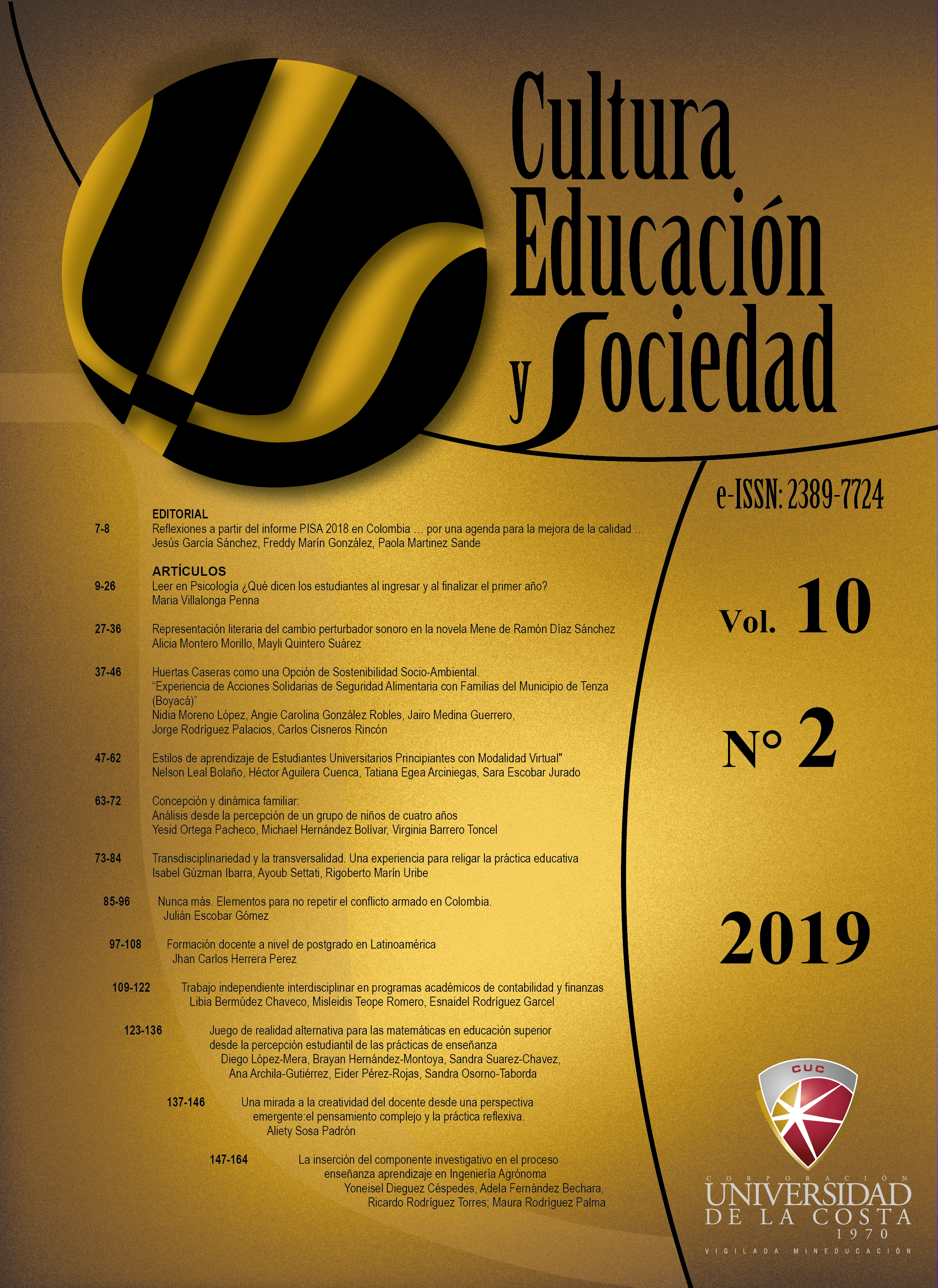Interdisciplinary independent work in the accounting and finance
DOI:
https://doi.org/10.17981/cultedusoc.10.2.2019.09Keywords:
Teaching - learning process, Independent work, InterdisciplinaryAbstract
The development of cognitive independence of students in the teaching - learning process requires a reformulation, where special emphasis is placed on the direction of interdisciplinary independent work as a way of contributing to the achievement of the professional model posed by Higher Education. Consequently, with the role of teaching tasks in the direction of independent work and the need for teachers to be able to implement them, the fundamental elements of a didactic proposal oriented to actions to promote the development of independent work from the interdisciplinary, in such a way that they favor the progressive development of the students. The same is conceived taking into account the logic of the process of obtaining the knowledge: diagnosis, formulation, orientation and evaluation of independent interdisciplinary activity in the process teaching university learning; and examples by their components. The proposal of the didactic actions guaranteed an adequate and flexible structuring of the disciplinary nexuses, which constitutes a work tool for the pedagogical group of the discipline and of the year.
Downloads
References
Addine, F. (2004). Didáctica: Teoría y Práctica. La Habana: Pueblo y Educación.
Álvarez, C, M. (1998). La Pedagogía Universitaria. Una Expresión cubana. La Habana: Palacio de las Convecciones.
Cárdenas, N. y Angulo, F. ( 2016). Análisis de las dimensiones de adaptación, mejoramiento e innovación en los procesos de aprendizaje tecnológico. Cultura Educación y Sociedad, 7(2), 139–149. Recuperado de https://revistascientificas.cuc.edu.co/culturaeducacionysociedad/article/view/1468
Díaz, A. (1988). Didáctica y currículum. Convergencias en los programas de estudio. México D.F.: Nuevomar.
Ivarola, L. (s.f.). La economía desde una visión interdisciplinaria. En, XVI Jornadas de Epistemología de las Ciencias Económicas. (pp. 146–162). Buenos Aires: CIECE.
Labarrere, G. y Valdivia, G. (1989). Pedagogía. La Habana: Pueblo y Educación.
Marín, F. (2010). Construcción de conocimiento sobre desarrollo sostenible desde una perspectiva inter y transdisciplinaria. En, Investigación en Ciencias Humanas. Estudios Posdoctorales. Colección Ciencias Humanas. Vol. I. (pp. 49–68). Universidad del Zulia, Venezuela.
Martínez, B. y Addine, A. (2014). Metodología para el diseño del proceso de enseñanza-aprendizaje interdisciplinario en la disciplina formación laboral investigativa. Opuntia Brava, 6(3), 1–11.
Martínez, B. y Addine, A. ( 2011). Metodología para el diseño del proceso de enseñanza-aprendizaje interdisciplinario en el nivel año, desde el eje integrador problema profesional. Opuntia Brava, 3(1). Recuperado de http://www.opuntiabrava.rimed.cu
Mena, E. (2001). Autoevaluación y creatividad: un reto para la Pedagogía Contemporánea. [Tesis Máster]. ISPEJV, La Habana.
Ortiz, E. y Mariño M. (2003). Problemas Contemporáneos de la Didáctica de la Educación Superior. CECECS. Universidad de Holguín.
Pidkasisti, P. I. (1986). La Actividad Cognoscitiva Independiente de los Alumnos en la Enseñanza. Ciudad de la Habana: Pueblo y Educación
Silvestre, M. y Zilbersteins, J. (2000). Aprendizaje y Diagnóstico. ¿Cómo hacer más eficientes el aprendizaje? México, D.F.: CEIDE.
Published
How to Cite
Issue
Section
License
Copyright (c) 2022 CULTURA EDUCACIÓN Y SOCIEDAD

This work is licensed under a Creative Commons Attribution-NonCommercial-NoDerivatives 4.0 International License.
![]()
Creative Commons 2020 CULTURA EDUCACIÓN Y SOCIEDAD
This article is under international license Creative Commons Reconocimiento-NoComercial-SinObrasDerivadas 4.0.
The published articles are the sole responsibility of their authors and do not necessarily reflect the opinions of the editorial committee.
CULTURA EDUCACIÓN Y SOCIEDAD respects the moral rights of its authors, who assign to the editorial committee the patrimonial rights of the published material. In turn, the authors inform that this work is unpublished and has not been previously published.
All articles are under a:
Licencia Creative Commons Atribución-NoComercial-SinDerivadas 4.0 Internacional.
![]()


 English
English
 Español (España)
Español (España)




_12.53_.27_p_. m_._3.png)





_12.57_.35_p_. m_._3.png)
_12.50_.37_p_. m_._3.png)



